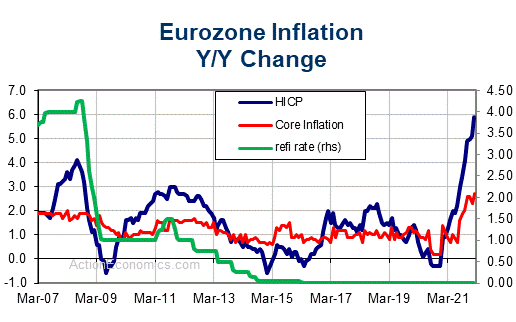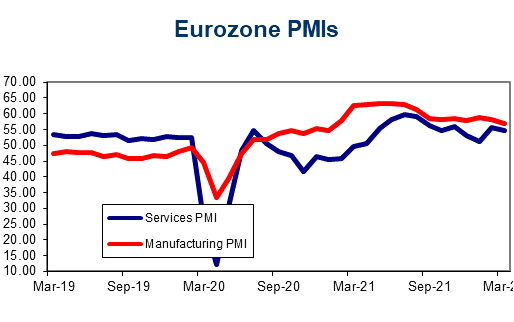The ECB did the expected and left overall policy settings unchanged. If anything the statement was a tad more hawkish in that it spelled out that the PEPP volumes don’t need to be used in full, and Lagarde also highlighted that while virus restrictions were tightened since the last meeting, there were also major positive developments that should support the medium term recovery, including the Brexit deal. Clearly the ECB is eager to keep spreads in and prevent markets from running away with the recovery story too early, but in the central scenario, the central bank will likely maintain its wait and see stance for the foreseeable future.
The key refi rate remains at 0.00%, the deposit rate at -0.50% and the ECB repeated that it expects the “key rates to remain at their present or lower levels until it has seen the inflation outlook robustly converge to a level sufficiently close to, but below 2%, within its projection horizon and such convergence has been consistently reflected in underlying inflation dynamics”. Inflation remained in negative territory at the end of last year and while Lagarde flagged that the headline rate is likely to turn positive as base effects from Germany’s temporary cut to the VAT rate fall out of the equation it is clear that the central bank doesn’t expect inflation to reach target for a while to come. And that the 2% limit will be turned into a symmetric target with the ongoing policy review seems more and more likely. That, however, would mean letting inflation run higher for a while, following the current period of underinflation, which pushes rate hikes even further into the future.

After the ECB strengthened its PEPP and TLTRO programs at the previous meeting it was always likely that policy settings would remain unchanged at the first meeting in 2021. Virus numbers may have risen again and restrictions tightened and/or extended, but as Lagarde highlighted, vaccination programs finally offer a feasible way out. Furthermore, the ECB President also stressed that the economic projections on the table in December were based on the assumption that there would be no Brexit deal and that the EU would trade with the UK on WTO terms. The agreement reached on December 24 may be limited, but it still offers a clear improvement compared to that scenario. Finally, EU member states reached a compromise on the final hurdles to the EU’s multi-annual budget that includes major recovery and financing programs, designed to support economies going forward.
Clearly, virus developments mean near term risks remain tilted to the downside, and Lagarde admitted that the most likely scenario remains a technical recession over Q4/Q1. Against that background, the ECB head repeated that it stands ready to use all instruments if necessary. However, it is clear that central bankers still expect a gradual recovery further out. And it is unlikely to be an accident that the introductory statement highlighted that “if favourable financing conditions can be maintained with asset purchase flows that do not exhaust the envelope over the net purchase horizon of PEPP, the envelope need not be used in full”. PEPP is currently set to run until the end of March 2022 and Lagarde highlighted during the Q&A session that favourable financing conditions for the ECB refers to private as well as public debt interest rates and across a wide range of financing tools. That clearly means that the central bank is keeping a very close eye also on spreads and won’t reference just one set of interest rates.

It is officially not yield curve control, but clearly yields – and for the ECB in particular, spreads between Bunds and lesser valued government debt, like BTPs – are a key measure by which to judge the need for ongoing support from the central bank. That in turn should help to prevent spreads from running away and moving out too quickly, although once economies start to re-open and vaccination programs have progressed sufficiently, the focus will return to the huge mountain of debt that has been accumulated during the crisis. Going forward then the pressure on the central bank will increase if and when asset purchases are phased out.
A Bloomberg story earlier this week suggested that the ECB has in fact a clear idea on where Eurozone spreads should be, and going forward these internal measures will become even more important than the actual level of the 10-year Bund, which remains the benchmark for now. Going forward, that may actually change if and when the EU extends its jointly funded debt programs, as there will be another highly rated and increasingly liquid player in town. A reduction in safe haven demand for Bunds should also help to keep spreads in and make the ECB’s job somewhat easier going forward. It will still be a challenge though if and when the ECB should attempt to rein in asset holdings and we suspect that while there clearly is no support for the notion that the ECB should just write off the accumulated debt, the pressure to extend PEPP perpetually and just hold bonds until they mature will increase, not necessarily this year, but clearly once we get closer to March 2022.
Click here to access the HotForex Economic Calendar
Andria Pichidi
Market Analyst
Disclaimer: This material is provided as a general marketing communication for information purposes only and does not constitute an independent investment research. Nothing in this communication contains, or should be considered as containing, an investment advice or an investment recommendation or a solicitation for the purpose of buying or selling of any financial instrument. All information provided is gathered from reputable sources and any information containing an indication of past performance is not a guarantee or reliable indicator of future performance. Users acknowledge that any investment in Leveraged Products is characterized by a certain degree of uncertainty and that any investment of this nature involves a high level of risk for which the users are solely responsible and liable. We assume no liability for any loss arising from any investment made based on the information provided in this communication. This communication must not be reproduced or further distributed without our prior written permission.


